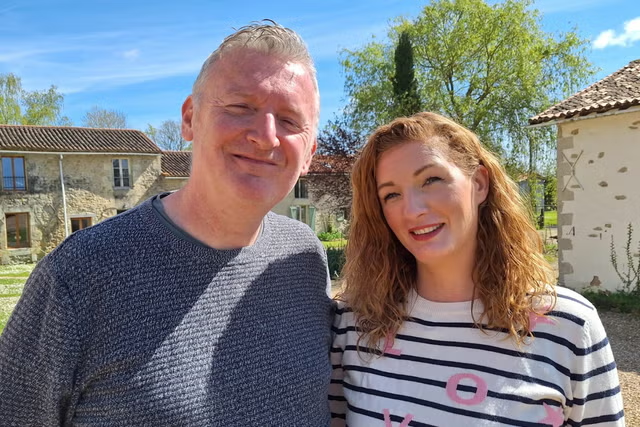Adam* first walked into my workplace in 2016, all intense, macho energy and charm. In reality, he was a master manipulator who wormed his way into my life before systematically destroying it. If only I had known then to keep him at bay.
It was 2016, and I was a separated mum in my mid 40s with a successful career in skills training. Adam brought clients into the office. Over coffee, with his big brown puppy dog eyes, he told me his brother had been killed but was uncomfortable saying how. I really felt for him, he seemed to need a friend.
I wasn’t looking for a partner. I’d recently come out of my long-term relationship, but for three months Adam lavished me with attention, it was a huge ego boost I suppose.
After four months, we were in a relationship and he’d encouraged me to go into business with him. He met my three children, then aged 11, 13 and 15, and was at my house five nights a week.
He called it a “whirlwind romance”. In reality this was his love-bombing and “information-gathering” phase, where he was finding out everything about me in order to make us feel closer. He would sweep me out to the fanciest restaurants and talk about his interests, cooking, the gym and cycling like me. And he was everything my ex hadn’t been.
We were in love, but there were red flags – he didn’t like me socialising or having a male osteopath – but he just wanted to protect me, he said. “Send me pictures when you’re out, I like seeing where you are.”
Accusations of cheating soon followed, however much I swore faithfulness.
I loved hiking and when I drove to the mountains with a friend, where there was limited phone reception, he went mad. “I’m going to fix your phone to make sure you’re always safe,” he texted. I reasoned he was anxious after his brother’s death but in fact, that’s when he started tracking me. As well as surreptitiously taking my picture, I recall him perched on the bath chatting, phone in hand, as I came out of the shower. I heard the click of a photo being taken, but when I asked him he laughed, “you’re paranoid”.
It would be two years later, when Adam was terrorising me, when I awoke one morning to find 40 Facebook friend requests from men in Pakistan. I couldn’t bear to even look at what had been sent and deleted the account, I dread to think what else he took without me knowing.
By eight months we fought constantly, though never physically. Because he never laid a finger on me, I think it took me longer to recognise his behaviour as abuse. “Victims” had bruises and cut lips, right?
The only time he hit me was during sex, never anywhere that would leave marks. I didn’t give permission for that, I didn’t like it rough, but who knows what’s “normal” in other people’s bedrooms? Was I just uptight? His other partners, he said, had been accommodating. Sexual coercion is so rarely discussed, I was so confused but also deeply ashamed. Adam wanted sex daily, and if I wasn’t in the mood he’d accuse me of sleeping around. It became easier just to go with it, or he’d mock me and keep me awake all night. The next morning I would plaster on a smile, get the children ready and go to work.
Slowly I became isolated; he wanted my undivided attention so didn’t like me seeing my personal trainer or friends. I didn’t want work people to know about us, so we kept the relationship secret, and while my friends sensed something was wrong, I felt too embarrassed to confide in them.
Over the next year I tried several times to end it, but it was complicated by our shared business, then he would claim undying love and we would end up back together. It was a confidence-destroying cycle as he criticised my looks, my cooking, my parenting, my work… everything.
My weight wildly fluctuated because he’d force me to eat saying I was “too thin,” but the next week “too fat”. It wasn’t just food, he had very particular hygiene and grooming routines. I had to shower twice a day, sometimes more. Adam dictated my make-up and hated me tanning, preferring pale skin.
Looking at old photos of myself I see a healthy woman in 2016, but by 2018 I was drawn, hunched, with blank eyes. My hair fell out and I lost two teeth because of recurring infections, which my dentist said were stress-related.
One time I was working overseas and he video called to “see my hotel room” (check I was alone), then exploded: “You’re wearing all black? I’ve told you not to!” His eyes turned black when angry. Even from abroad he controlled me. I questioned every tiny decision, fearing his reaction.
Later, in therapy, I learned there was a name for his behaviour – coercive control – in which it’s common to believe the abuser is right and blame yourself. I was also educated about “narcissistic personality disorder” (essentially a mental health condition in which people have an unreasonably high sense of their own importance). But back then I thought he was just hot-headed, over-protective.
There was endless gaslighting too, I was in the kitchen roasting lamb when he came in and angrily cried “You’ve got that oven up too high, you’re ruining dinner!” He’d never used my oven, while I’d been making roasts for years, so I ignored him. Twenty minutes later he reappeared: “What are you playing at? You’ve got the oven too low!” I hadn’t changed a thing. The penny dropped, how many times had I reacted to his insane demands in a desperate bid to placate him? I started paying more attention after that.
The final time I plucked up the courage to end it, almost two years after we had met, was when the stalking began. He refused to accept we were over, so stood outside my house for hours, ringing the doorbell and controlling my home speakers from his mobile. I tried to get my ex to take the kids, but they were mostly with me, so all this impacted them too.
He caused a scene at work in front of customers. I could only get him to leave by promising to unblock him on my phone. Later that night I was so scared I drove around for five hours, returning to an email saying he’d overdosed but had his stomach pumped. I was beside myself, as much as I was scared I didn’t want him dead. I later discovered it was a lie.
Stupidly, I took him back, and was made to feel guilty for his sore throat because of the stomach pump. It was the most frightening and miserable time of my life. I knew I needed an exit plan, I just didn’t know what.
I knew I had to get out of our business, and that’s when the police got involved in August 2018. I resigned, had the paperwork delivered to him and he went berserk. He lied to customers, smearing my name, so I told the police and hired a lawyer. I took public transport to her office because I was so scared and prayed he wouldn’t kill me in public.
I finally poured my heart out for the first time to that lawyer, who said this was domestic abuse.
With her help, it cost me £9,000 to get a restraining order, which he broke multiple times over the next hellish two years. He would get arrested for breaching it, then be released on bail or wouldn’t show up at court. It was torture and I needed beta-blockers to leave the house while the police enquires went on. And while he was getting legal aid I was losing thousands of pounds each time.
Despite all the things he’d put my through, domestic and sexual abuse, harasment and theft, perjury, slander and libel, attempted extortion, vandalism, identity theft, fraud and psychological torture, it was a stalking charge that my lawyer would prosecute him for. I wanted to see him ripped to shreds in court, but when Adam finally appeared in the dock he immediately pleaded guilty to stalking.
I felt angry and let down by the criminal justice system, but as only 4 per cent of stalking perpetrators are ever convicted, I am considered “lucky”. He was sentenced to nine months in prison – but was released after 100 days.
Adam turned my life upside down and in the short window he was inside I had to make major life changes and start again from scratch. I changed my name and I dare not even register to vote, effectively I’ve become a “non-person”. I swapped careers, lost thousands of pounds, moved cities and altered my appearance. I haven’t posted a selfie since 2018, so he doesn’t know what I look like now. When I’m in certain places I still wear a wig, hat or a mask and dress in track suits instead of my normal clothes.
I still have PTSD and probably always will. I am getting better, therapy taught me coping strategies though learning to relax when I still need my wits about me seems impossible. I’m no longer on medication.
I worry constantly about my family’s safety, every minute of every day. The thought of being with another man in the future is too overwhelming. I feel like I’ve been to hell and back. My focus now is repairing the relationships I have with my family, my friends and crucially, myself.
*Names and some details have been changed to protect identities.
As told to Susanna Galton
How to survive a coercive control relationship
Georgina Sturmer is a women’s counsellor and member of the British Association for Counselling and Psychotherapy who has supported many clients who’ve experienced domestic abuse and coercive control. Here is her advice.
Keeping track
Find a way to keep track of the behaviours that you notice, and to record it so that you can understand a pattern of behaviour. Make sure that you are careful, think about having a second phone, or taking steps to cover your tracks when you are online. Women’s Aid has some useful information on staying safe and covering tracks.
Maintain a support network
If your partner has attempted to isolate you it might be very hard to stay in contact with people you can turn to, but it’s so important to try to reach out in order to retain a sense of your own identity – and to ensure that you’ll have support if you are able to leave.
Consider devising a practical plan to leave
This process is two-fold. The practical: what do you need in terms of belongings, money, documentation, and support. And the emotional process: thinking about leaving a controlling relationship can bring overwhelming feelings, such as anger, frustration, guilt, embarrassment, anxiety or fear. Starting to really notice these feelings can help us on the way to liberating ourselves from the situation.
Connect with local support services
Know where you can go and who you can call for help. There are a whole range of strands of support that are available, including legal, advocacy, peer support, skills development, and counselling.
Therapeutic support
Counselling can offer a non-judgemental, confidential space to explore and understand our relationships. This can be a space for you to develop your self-esteem and resilience, and to understand your own personal story.
Where to seek help
Local women’s centres offer an incredible array of services if you google what’s in your area, but these are excellent for advice and nationwide:
- Women’s Aid
- Refuge
- National Domestic Abuse Helpline
- Watford Women’s Centre
- Shout
- Home-Start (for parents with children aged under 5)
For further information see @stopyourstalker on Facebook or Instagram.
Disclaimer: The copyright of this article belongs to the original author. Reposting this article is solely for the purpose of information dissemination and does not constitute any investment advice. If there is any infringement, please contact us immediately. We will make corrections or deletions as necessary. Thank you.



